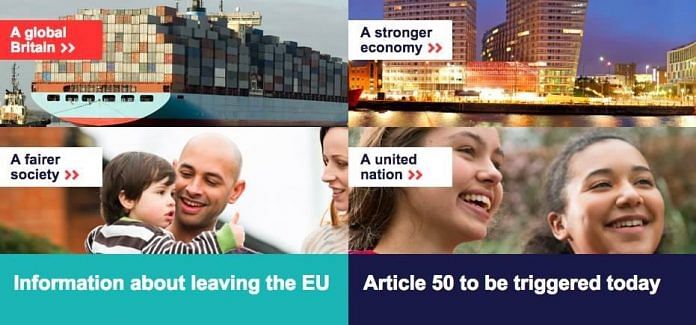While Britain begins to negotiate its exit from the European Union, Scotland and the EU are also trying to figure out the shape of their future.
“Britain has lost an empire and has not yet found a role.”
This 1962 quote from former US Secretary of State Dean Acheson, was sufficient to irk British neo-imperialists back then. Strangely, that line still resonates, pointing to some deep-rooted problems in British politics and how the country still perceives its status in the world.
This week marks three profound events in British and European politics. On Wednesday, British Prime Minister Theresa May signed a letter invoking Article 50 of the Lisbon Treaty, allowing the start of negotiations for Britain’s official exit from the European Union (EU). But just before that, Scottish Parliament under Scottish Nationalist Party (SNP) leader Nicola Sturgeon agreed to hold another referendum over Scotland exiting the UK. And finally, this week marks the 60th anniversary of the Treaty of Rome of 1957 through which six Western European powers came together to launch the European Economic Community – the precursor to today’s EU.
The key question in everyone’s mind is whether the British government will seek a hard or a soft exit. Hard exit means a complete exit from the Single Market and the Customs Union. Soft exit signifies the UK continuing to be a part of the Single Market and the Customs Union – while having to pay more to the European Commission’s budget in order to negotiate less immigration from the states of European Union.
Even with a thin majority of 16 in the House of Commons, May has consolidated power in 10, Downing Street. As she looks to start negotiations with Brussels, critics say she has surrounded herself with “hard-Brexiteers”. The negotiations though are likely to be extremely tedious from both sides. The consensus opinion continues to be that it would be extremely hard for her government to negotiate a deal by the end of the stipulated two years.
To Britain’s misfortune, political signals from both Europe and Britain make reaching a deal look like a daunting task. There are elections coming up this year in both Germany and France – the strongest pillars of the EU – and if the results are in favour of unorthodox parties, not only could the balance within EU be tipped but in extreme scenarios it could unravel the very Union itself.
Populist and nationalist surges across countries in Europe are either pushing the centrists out of power or forcing them to adopt harder positions. The southern and eastern European states have been disillusioned with the EU since the 2008 financial crisis and have repeatedly asked for reform. It has led to Europhobic parties surging in poll numbers across Europe — Alternatives of Deutschland in Germany, National Front in France and Swedish Democrats in Sweden, among others.
Meanwhile, European Commission — the chief supranational institution of the EU will look to make negotiations for Britain challenging, signaling to the rest of the 27 EU member states the high costs of exiting. The chief EU Brexit negotiator, Michel Barnier, has already asked Britain to first negotiate its exit bill — reported to be around €60 billion — before any trade negotiations could even begin.
The signs on the British side aren’t very encouraging either. British politics is undergoing massive polarisation. Some of Britain’s political elite have still not been able to come to terms with last summer’s 52-48 per cent referendum result in favor of Brexit. One sees evidence of that in recent speeches by former British prime ministers John Major and Tony Blair. May’s Conservative Party continues to be deeply divided on matters of Europe. On the other hand, the traditional other half of British politics, the Labour Party — polling the lowest since 1930s, continues to endure an existential crisis under their infamous leader Jeremy Corbyn.
The Brexit referendum result has led to Scotland seeking another referendum on its freedom from the UK. To make matters worse for Westminster, the situation in Northern Ireland is growing more volatile by the week. Jean Junker, the President of the European Commission, in an interview to Financial Times this week, remarked that former British Prime Minister David Cameron would not be judged kindly by history and called him a “destroyer” who destroyed UK to some extent.
As often stated by British Foreign Secretary Boris Johnson, the principle claim of the Brexit campaign was reclaiming UK’s right to having trade agreements with the world independent of the EU. The irony in that claim could not have been starker. It is extremely unlikely that any state will negotiate a trade agreement with the UK before its negotiations with the EU are over. And once out of the union, UK might find its trading leverage over the world severely reduced.
This leads us to the celebrations happening this week in Rome, commemorating 60 years of the union. The main item on the agenda of the Rome Summit is about having a two-tier European Union where the core-states can move towards further integration, while the periphery (southern, central and eastern) states can negotiate their place in the Union. Ironically, back in the 1980s, the threat of having a two-tier Europe was used by France and Germany to force Britain to sign on to a more political union of Europe through the Single European Act of 1986. As EU decision makers now look to go back to that very idea of a two-tier Europe, Britain will begin to work on its exit from Europe.
Srijan Shukla is a student of politics at McGill University, Montreal, and is presently on an exchange programme at Oxford University.



